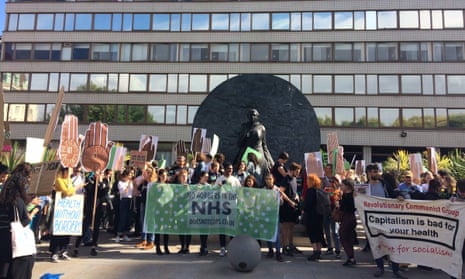Protesters gathered at St Thomas’ hospital in central London on Saturday to voice opposition to the introduction of ID checks at hospitals and up-front charges for patients not eligible for NHS care.
People from overseas are already liable for the cost of treatment, but new rules will require hospitals, community interest companies and charities receiving NHS funds to identify such patients before treatment in order to bill them.
At the same time, 20 hospitals across the UK are trialling ID checks that require patients to present two forms of ID before they are treated. The government says that the changes lower the burden from health tourism, which is blamed for costing the NHS millions every year.
#PatientsNotPassports protesters gather in front of the Mary Seacole statue at St Thomas Hospital pic.twitter.com/WE70AaTWUq
— Damien Gayle (@damiengayle) September 30, 2017
Critics fear that the new checks will discourage undocumented migrants from accessing vital care, which could pose a risk to the wider public.
Jess Potter, a part-time registrar at St Bartholomew’s hospital who specialises in lung problems including tuberculosis, said patients suffering from the infectious disease could go undetected if they were afraid to visit a doctor.
“In the UK about 75% of tuberculosis cases are people who are not born here and moved here from countries where it’s more common,” said Potter, who is doing a doctorate in access to healthcare for TB patients.
As a dangerous and infectious disease, TB falls under a range of conditions for which patients will not be charged up front. “But people don’t walk around with a big sign saying: ‘I’ve got TB,’” Potter said.
“They come and tell us they’ve got a fever, and we won’t be able to treat them up front for that unless we know they’ve got TB. If people are being threatened with charges it means they will be discouraged from seeing us, and if they say they’ve got a cough, we will say: ‘That’s not life-threatening and so you will have to pay before we look at you.’”
#patientsnotpassports NHS worker tells her opposition pic.twitter.com/eKC4oj3HCH
— Damien Gayle (@damiengayle) September 30, 2017
Several hundred protesters met on Saturday afternoon in front of the hospital’s statue of Mary Seacole after marching from three nearby locations.
One by one, activists read out testimonies gathered from people who had been saddled with heavy bills for treatment for conditions including meningitis, Aids, serious allergic reactions and complications with pregnancies.
One anonymous patient said: “I suffer from an anxiety disorder so I was using the NHS for support, but when they started asking questions and challenging my identity, I became too anxious to even see a doctor. Now I’m forced to pay for private doctors when I can afford it, but really I can no longer get the help I need.”
The story of a mother wrongly charged £5k for her son's meningitis treatment #patientsnotpassports pic.twitter.com/DfpWei64Pk
— Damien Gayle (@damiengayle) September 30, 2017
A statement read out by organisers from the Docs Not Cops campaign group accused the government of trying to blame migrants for the NHS funding crisis. “At most, so-called health tourism only accounts for 0.3% of the NHS budget,” they said.
“In reality these changes will destroy the relationship NHS workers have with patients and create a climate of fear that stops people accessing the care they need. Already there are stories of patients being racially profiled when accessing care and being singled out for immigration checks.”
Why do we need the #patientsnotpassports demo? Organisers explain pic.twitter.com/r4FxkoTyFS
— Damien Gayle (@damiengayle) September 30, 2017
Dr Timesh Pillay, a member of Docs Not Cops, said: “Eligibility checks directly and disproportionately burden individuals who are ill, from lower socio-economic backgrounds and identify as BME, whether they be legally eligible to NHS care or not.
“This surmounts to no less than structural violence. This policy is a barrier to me providing empathic mutualistic healthcare as it often overshadows the consultation. I believe in a healthcare system independent from the policies of the Home Office and UK Border Agency that is freely accessible to all.”
